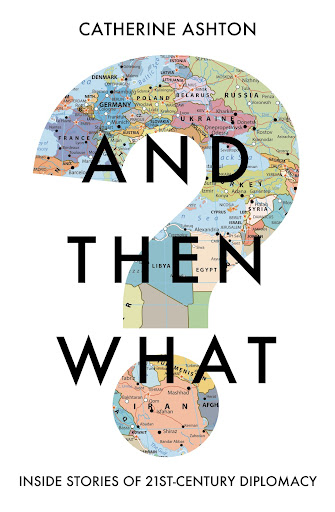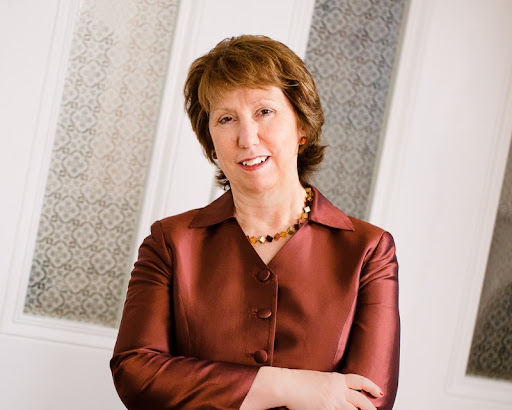 LONDON – So much of modern-day diplomacy still takes place behind closed doors, away from cameras and prying eyes. But what does this vital role really look like in today’s world?
LONDON – So much of modern-day diplomacy still takes place behind closed doors, away from cameras and prying eyes. But what does this vital role really look like in today’s world?
From 2009 to 2014, Catherine Ashton was the EU’s first High Representative for Foreign Affairs and Security. Arriving in Brussels as a relative novice to international diplomacy, she faced the challenge of representing the views and values of 28 nations during one of the most turbulent times in living memory.
From Russia’s invasion of Crimea to the Iran nuclear negotiations, she led the EU’s response, charting a path toward collaboration and stability. There were challenges, failures and moments of success. She encountered dictators and war criminals, and witnessed the aftermath of natural disasters, military action, and political instability.
Now for the first time, in “And Then What?” (Elliott & Thompson, Feb. 23, 2023) she takes us behind the scenes to show what worked and what didn’t, and how it felt to play a part in tackling some of the major international crises of our time.
- An expert author with a ringside seat: Catherine Ashton was responsible for coordinating the EU’s response to international crises and led historic negotiations such as the Serbia-Kosovo Accord of 2013. Her account includes encounters with Vladimir Putin, Nicolas Sarkozy, David Cameron and many more.
- Incredibly timely: Many of today’s crises around the world have their roots in this period, and this book offers crucial insight into contemporary international relations.
- Essential reading: For anyone interested in geopolitics, international diplomacy and current affairs.
And Then What?
Inside Stories of 21st-Century Diplomacy
Catherine Ashton | Feb. 23, 2023 | Elliott & Thompson | Nonfiction / Politics
Hardcover | ISBN 978-1783966349 | $29.95
Ebook | $29.95
About the Author
 Catherine Ashton served as the European Union’s first High Representative for Foreign Affairs and Security Policy from 2009 to 2014, and the first female EU Commissioner for Trade. She is a life peer and former Leader of the House of Lords, and served as a UK government minister in the Education and Justice departments. She is a Distinguished Scholar at the Woodrow Wilson International Center for Scholars in Washington DC and a consultant to the Geneva-based Centre for Humanitarian Dialogue.
Catherine Ashton served as the European Union’s first High Representative for Foreign Affairs and Security Policy from 2009 to 2014, and the first female EU Commissioner for Trade. She is a life peer and former Leader of the House of Lords, and served as a UK government minister in the Education and Justice departments. She is a Distinguished Scholar at the Woodrow Wilson International Center for Scholars in Washington DC and a consultant to the Geneva-based Centre for Humanitarian Dialogue.
Topics that Catherine Ashton can explore in an interview:
- What is diplomacy? How does it work? Do we need more of it, or is it just talking instead of action? As the U.S. looks at the challenges of the future – Putin’s war in Ukraine, Xi Jinping’s determination to put China ahead, Europe’s inability to shoulder more of the burden – how could international diplomacy resolve some of the problems we face?
- “And then What?” poses the ultimate question faced by leaders as they try to grapple with all of the crises and problems they face. It can be easy to work out the first steps – but then what? How do you deal with the uncertainties that will inevitably follow? What lessons can we take away from some of the challenges we have already faced?
- Diplomacy conjures up different images: from dinner parties in chandelier lit ballrooms to convoys of UN vehicles on dusty roads. What is it really like to be thrust into that world and face some of the most pressing challenges of a generation?
- The problem with diplomacy is we don’t have enough of it, and we don’t give it enough tools in the toolkit. How do we equip diplomats with what they need?
- “And Then What?” was written for people who want to know what it is really like to be in the room during the Iranian talks; to see how President Putin works close up; who want to understand how diplomats work and the real dilemmas they face.
- President Putin is much on people’s minds now as they contemplate the effects of the ongoing war with Ukraine. But where did this all begin? How did the Ukraine crisis start?
- The origins of other significant crises around the world (for example, in Libya and the Arab Spring) – Going back to the beginning and seeing the role that key leaders played is important to our understanding of how we got here.
- As the world waits to see if the nuclear deal with Iran can be revived, how did the U.S., China, Russia and three European countries (UK, France and Germany) working under EU chairmanship get the deal in the first place? What was it like in the room?
Praise for Catherine Ashton’s “And Then What?”
“A riveting, absorbing account of modern diplomacy by one of the greatest international diplomats of recent times. ‘And Then What?’ is hugely informative, full of tremendous insights, and a truly great read!”
– General David Petraeus (US Army, Ret.), former Commander of the Surge in Iraq, US Central Command, and NATO/US Forces in Afghanistan, and former Director of the CIA
“Brilliant – suspenseful and dramatic. I read it in a day.”
– Ken Follett, international bestselling author of “The Pillars of the Earth”
“Cathy Ashton was not a diplomat, but she became the EU’s top diplomat overnight in 2010 and was immediately plunged into a host of global crises. Her account of some highlights of her time in and away from Brussels makes fascinating and illuminating reading. From Haiti to Libya, reconciling Serbia and Kosovo, the Iran Nuclear deal and the start of the Ukraine drama, she was immersed in the hard grind of global crisis management. Modest but highly professional, she made a major impact – and this book is truly remarkable history.”
– Lord (George) Robertson, Former Secretary General, NATO
“‘As I read ‘And Then What?’ I couldn’t help but think of the bar scene in Star Wars. A prerequisite for future diplomacy among such characters, including our progeny, is the success of diplomacy such as Cathy Ashton reports here, in lieu of war and a dead-end future. If generations of Earthlings-to-be do indeed engage in cosmic negotiations with other lifeforms, it will be because of the success of Cathy and her diplomatic compatriots in bringing us to realize we are Earth-life, together.”
– Rusty Schweickart, Apollo 9 astronaut
“This is not an ordinary diplomatic memoir. Cathy Ashton worked tirelessly to mitigate the devastating consequences of real and political earthquakes while the EU’s de facto Foreign Minister. She combines acute analysis with moving portraits of the many people she engaged with, from dictators to shopkeepers; from overworked civil servants to distressed toddlers searching in vain through rubble for their parents; from the revolutionary youth of Tahir Square to jaundiced negotiators who wanted a deal but didn’t know how to strike it. During her time in office, Ashton eschewed the limelight. While avoiding self-promotion and deflecting the arrows of appalling misogyny from the quivers of the media as well as of some of the EU’s male establishment, she was at the heart of at least two of the most important international agreements of the early twenty-first century, the Iran nuclear deal and the first major step towards rapprochement between Kosovo and Serbia. Perhaps most surprising is her story-telling ability – each episode in this book has the element of a thriller combined with that of the most perceptive travel writer. And together it throws an entirely new light on the monumental political processes that shook the globe in the wake of the 2008 financial crisis. A must for students of politics and a treat for lovers of general non-fiction.”
– Misha Glenny, Rector of the Institute for Human Sciences, Vienna, and author of “McMafia”
“A surprise appointment as High Representative – effectively the EU’s Foreign Minister – and initially dismissed as too inexperienced, Catherine Ashton became recognised as a brilliantly effective diplomat and negotiator, winning international acclaim for two personal triumphs: her brokering of an agreement between Serbia and Kosovo in 2013 and her leading role in the Iran nuclear deal of the same year. This riveting, deeply personal and wonderfully accessible book takes the reader inside the room during the successes, setbacks and personalities of this turbulent period of history.”
– Sir Kim Darroch, former British Ambassador to the USA, National Security Advisor, and UK Permanent Representative to the EU
“Cathy Ashton’s gripping memoirs are not only a perfect combination of very precise facts and touching personal emotions, but for all foreign policy observers they convey important lessons of the past to serve for the crises of today.”
– Pierre Vimont, former French ambassador to the EU and the USA

A former award-winning journalist with national exposure, Marissa now oversees the day-to-day operation of the Books Forward author branding and book marketing firm, along with our indie publishing support sister company Books Fluent.
Born and bred in Louisiana, currently living in New Orleans, she has lived and developed a strong base for our company and authors in Chicago and Nashville. Her journalism work has appeared in USA Today, National Geographic and other major publications. She is now interviewed by media on best practices for book marketing.

